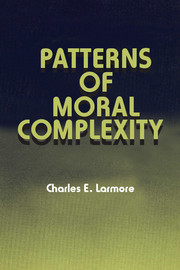
-
Select format
-
- Publisher:
- Cambridge University Press
- Publication date:
- 05 June 2012
- 30 January 1987
- ISBN:
- 9780511625107
- 9780521338912
- Dimensions:
- Weight & Pages:
- Dimensions:
- (228 x 152 mm)
- Weight & Pages:
- 0.355kg, 212 Pages
- Subjects:
- Philosophy, Political Philosophy
You may already have access via personal or institutional login- Subjects:
- Philosophy, Political Philosophy
Book description
Larmore aims to recover three forms of moral complexity that have often been neglected by moral and political philosophers. First, he argues that virtue is not simply the conscientious adherence to principle. Rather, the exercise of virtue apply. He argues - and this is the second pattern of complexity - that recognizing the value of constitutive ties with shared forms of life does not undermine the liberal ideal of political neutrality toward differing ideals of the good life. Finally Larmore agrues for what he calls the heterogeneity of morality. Moral thinking need not be exclusively deontological or consequentialist, and we should recognize that the ultimate sources of moral value are diverse. The arguments presented here do not attack the possibility of moral theory. But in addressing some of the central issues of moral and political thinking today thay attempt to restore to that thinking greater flexibility and a necessary sensitivity to our common experience.
Reviews
"....a solid piece of work--clearly written, admirably free of cant, historically informed, and analytically ambitious. It is a fine contribution to moral theory." Bart Schultz, Ethics January 1989
Contents
Metrics
Altmetric attention score
Full text views
Full text views help Loading metrics...
Loading metrics...
* Views captured on Cambridge Core between #date#. This data will be updated every 24 hours.
Usage data cannot currently be displayed.
Accessibility standard: Unknown
Why this information is here
This section outlines the accessibility features of this content - including support for screen readers, full keyboard navigation and high-contrast display options. This may not be relevant for you.
Accessibility Information
Accessibility compliance for the PDF of this book is currently unknown and may be updated in the future.


